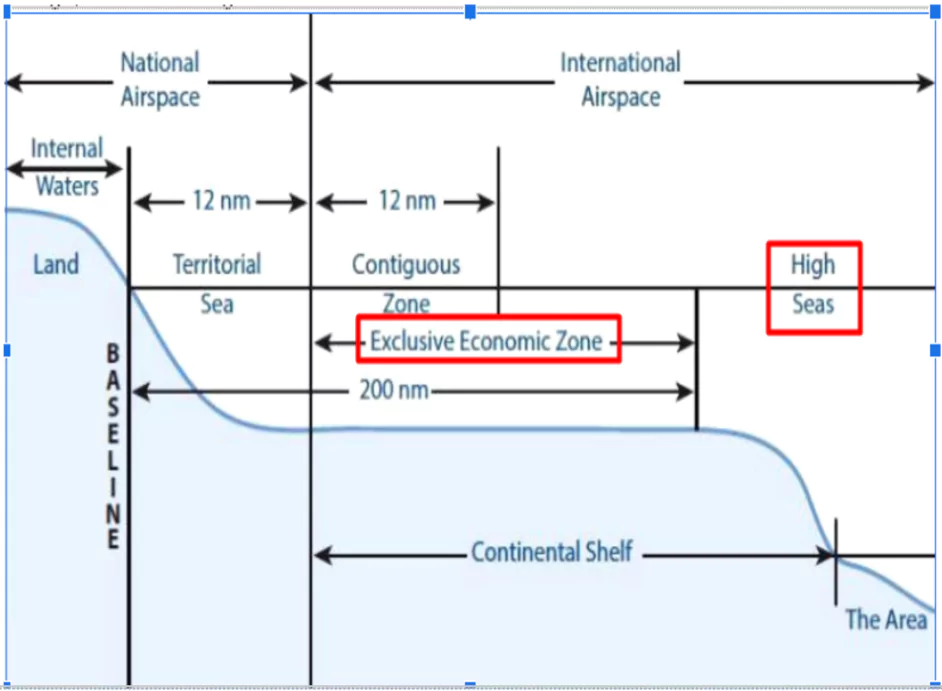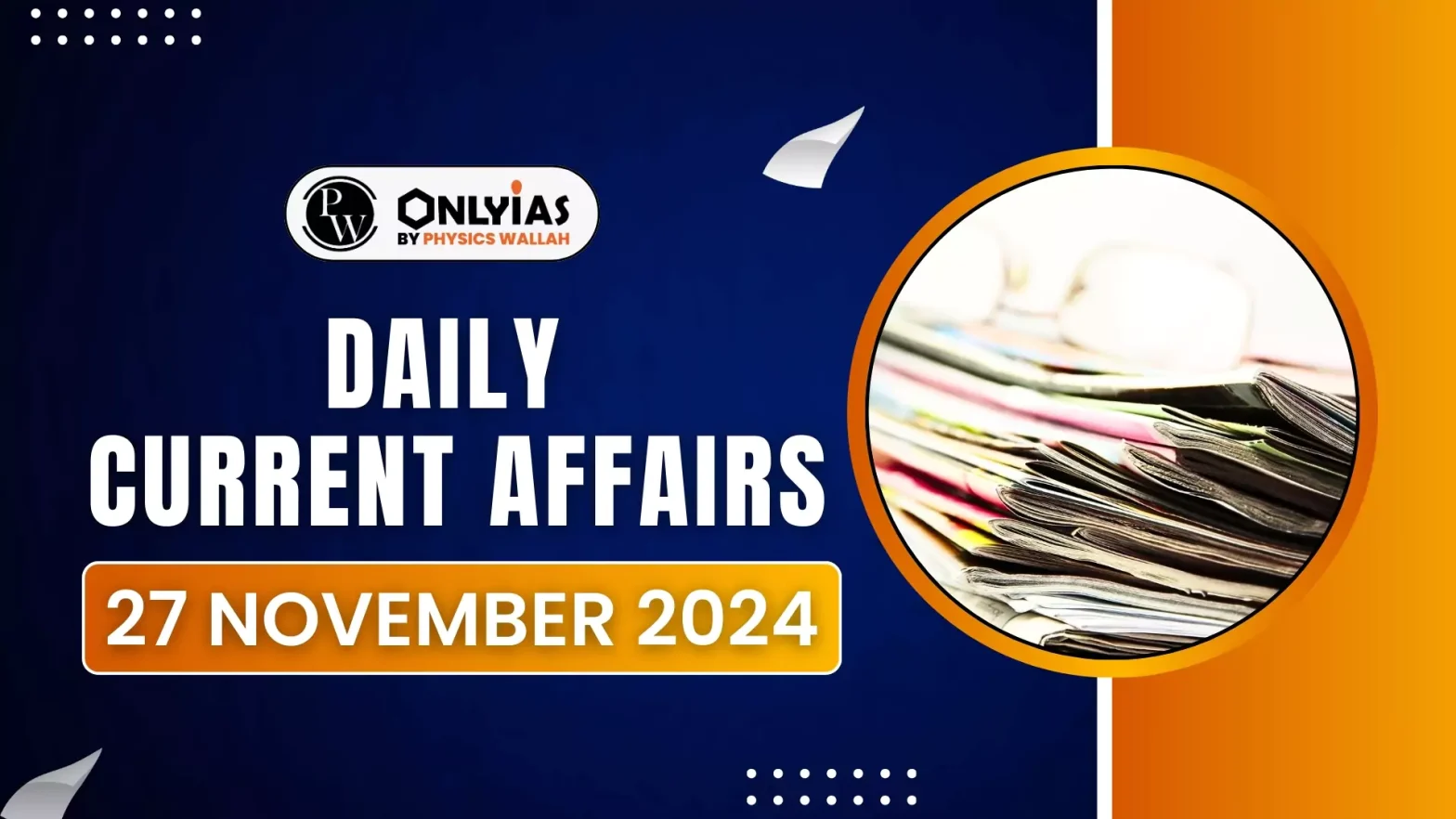India’s recent signing of the Biodiversity Beyond National Jurisdiction (BBNJ) Agreement, also known as the High Seas Treaty, has sparked a mix of optimism and scepticism.
About BBNJ Agreement
- The BBNJ Treaty is the third implementing agreement under the United Nations Convention on the Law of the Sea (UNCLOS).
- Other two agreements are 1994 Part XI Implementation Agreement (regulating mining in international seabed areas) and the 1995 UN Fish Stocks Agreement (conserving and managing fish stocks).
Enroll now for UPSC Online Classes
United Nations Convention on the Law of the Sea (UNCLOS)
- UNCLOS is an international treaty adopted in 1982 and entered into force in 1994.
- Signatorie : Over 168 countries have ratified UNCLOS.
- Objective: To establish a comprehensive legal framework for all marine and maritime activities, including navigation, fishing, mineral resources, and environmental protection
Objectives:
- Establish a legal framework for the use and conservation of the oceans and their resources
- Promote peaceful use of the seas and oceans
- Protect the marine environment
Major Initiatives:
- Division of Marine Areas:
- Territorial Sea: Defines the area adjacent to a coastal state’s land territory, extending up to 12 nautical miles.
- Contiguous Zone: Extends 12 nautical miles beyond the territorial sea, granting states rights to enforce customs, fiscal, immigration, and sanitary laws.
- Exclusive Economic Zone (EEZ): Extends up to 200 nautical miles from the baseline, granting states sovereign rights over resources, including fish, oil, and gas.
- Continental Shelf: Encompasses the seabed and subsoil beyond the territorial sea, extending up to 200 nautical miles or beyond, depending on geological factors.
- High Seas: Areas of the ocean not within any state’s jurisdiction, governed by principles of freedom of navigation, fishing, and scientific research.
- International Seabed Authority: An international organization responsible for regulating mining activities in the international seabed area.
- Seabed Mining: Governs exploration and exploitation of mineral resources in the international seabed area
- Marine Pollution: Sets standards for marine pollution prevention and control
- Marine Scientific Research: Promotes marine scientific research and the sharing of knowledge.
India’s Status at UNCLOS:
- India is a signatory and party to UNCLOS.
- India has actively participated in the development and implementation of UNCLOS.
- India has benefited from UNCLOS, particularly in terms of its maritime boundaries and resource claims in the Indian Ocean.
|

- It focuses on three main objectives:
- Conserving Marine Biodiversity: Establishing mechanisms like Marine Protected Areas (MPAs) to safeguard ecosystems.
- Equitable Sharing of Marine Genetic Resources: Ensuring that profits from these resources benefit all countries through a global fund.
- Environmental Impact Assessments (EIAs): Mandating evaluations for activities with potential harmful impacts on marine environments.
Challenges in Implementation of BBNJ Agreement
- Ratification and Consensus: With only 14 out of 104 signatories having ratified the agreement, it is far from the threshold of 60 ratifications needed to come into force.
- Maritime territorial disputes, such as those in the South China Sea, complicate consensus on creating MPAs. Many countries fear such measures could infringe on their economic opportunities or territorial claims.
- Regional apprehensions, especially in areas like the Bay of Bengal, highlight concerns about how MPAs might affect livelihoods and access to marine resources.
- Marine Genetic Resources: The treaty mandates profit-sharing from marine genetic resource exploitation.
- Wealthier nations could potentially undermine this provision by underreporting activities due to weak accountability mechanisms.
- Overlaps with other regimes like the Convention on Biological Diversity with risk of disadvantage for smaller nations and creating fragmented enforcement.
- Capacity-Building and Technology Transfers: While the treaty emphasizes equitable partnerships in ocean science, it lacks enforceable mechanisms to ensure capacity-building.
- This asymmetry risks sidelining low and middle-income countries, perpetuating inequalities in research and governance.
- High-Seas and EEZ Interconnections: The treaty’s focus on high-seas governance overlooks the interconnected nature of marine ecosystems.
- Pollution, overfishing, and habitat destruction in Exclusive Economic Zones (EEZs) often spill into international waters.
- Coastal states’ reluctance to address activities within their waters further weakens the treaty’s enforcement framework.
- Environmental Impact Assessments (EIAs): The treaty requires EIAs for planned activities in international waters but excludes critical issues like oil and gas exploration, which remain significant economic interests for many states.
- There is resistance to international review of EIAs, particularly in regions with limited institutional capacity and conflicting legal standards.
Check Out UPSC NCERT Textbooks From PW Store
Way Forward
- Integration of Coastal and High-Seas Governance: Establishing a cohesive framework that aligns high-seas regulations with coastal activities.
- Incentives for Coastal States: Encouraging Global South countries to align domestic laws with international norms by providing financial and technical assistance.
- Commitment from Wealthier Nations: Ensuring equitable sharing of treaty benefits through sustained support for capacity-building and technology transfer.
- Clear Implementation Roadmap: Defining enforceable mechanisms and fostering political consensus to address the treaty’s structural limitations.
Additional Reading: BBJN
![]() 27 Nov 2024
27 Nov 2024

